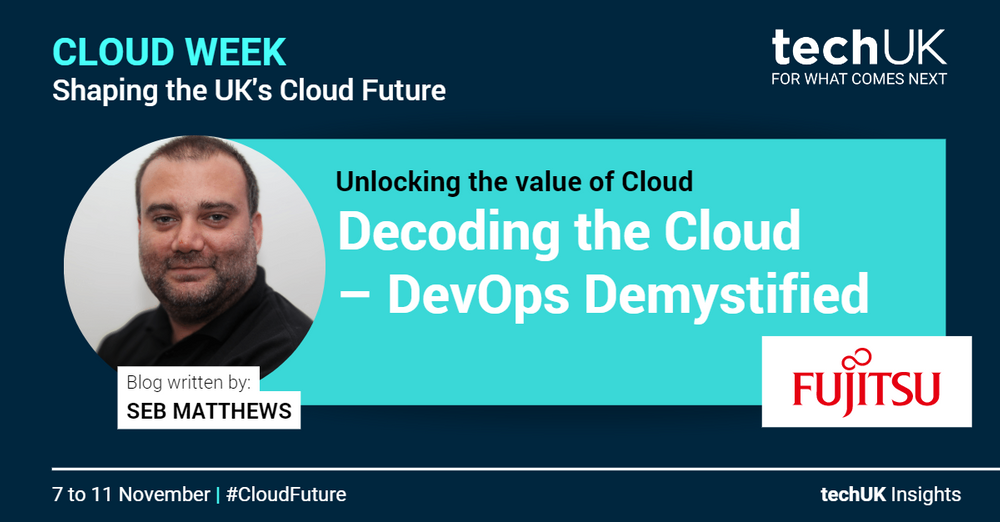Decoding the Cloud – DevOps Demystified (Guest blog from Fujitsu)

Author: Seb Matthews, Chief Architect & Fujitsu Distinguished Engineer, Fujitsu UK
Life Moves Pretty Fast
For today's IT leaders, the world is moving pretty fast. As a result, methods, frameworks, and standards constantly flux, making strategy execution a challenge.
With the ubiquity, flexibility, and utility of the cloud no longer in question, organisations seek more than the superficial benefits of cloud adoption. Instead, they want to take the opportunity to truly transform by embracing modern operating models to improve IT service across the piece.
Executing an organisational mandate to modernise is likely to be costly, regardless of size. Any savvy IT leader will recognise that investing in the wrong transformative agents will potentially damage the organisation and be career-limiting for the individual.
IT leaders must be well-versed in constantly changing options - an unenviable challenge - which can often result in analysis paralysis, slowing progress and burdening transformation with unnecessary risk.
Enabling Transformation
One particularly challenging aspect of transformation in the context of the cloud is how to adopt modern culture and practices to improve cloud maturity, enhancing the value given back to the organisation.
With so many possibilities in the ecosystem, technology leaders need help to discern what will positively impact the efficacy of their IT, with the challenge becoming ever more complex as historically separate disciplines are laminating together, particularly the fields of development and operations.
In days past, engineering (the folks that build) and operations (the folks that run) were distinct factions of the IT organisation, each with unique objectives, skills, practices, and deliverables. This disjointed approach causes many problems, which is not a surprise when considering the fundamentally different nature of their goals.
The much-vaunted lamination of development and operations - DevOps - is definitely on trend, but what is it, and what does it mean for the organisation and its adoption of the cloud?
What the Devil is DevOps?
There is endless discussion about DevOps and its definition, but let's keep things simple - think of DevOps as a philosophy - it is not so much a 'thing' as it is a 'way'. Organisations don't 'buy' or 'install' DevOps. Instead, they manifest a culture of DevOps. All very Zen.
With a cornucopia of modern terminologies such as Site Reliability Engineering ('SRE'), Platform Engineering, Product Engineering, Platform Experience, AIOps, and NoOps emerging, the landscape of DevOps can be confusing.
In a pragmatic sense, DevOps is the doctrine that brings together collaborative practices for development, deployment, quality, security, operations, management, and more. Success with DevOps comes when mindset, methodology, technology, and people are in concert to deliver and operate viable, reliable, and value-adding products to the user community.
Products? Surely Not!
The old guard often wraps themselves around the axle of DevOps in their unwillingness to recognise that everything delivered in a DevOps world is considered a product. Software being a product is an easy sell, but describing a platform as a product? Heresy!
Furthermore, the minute the term 'product' gets used, an elephant clomps into the room; Agile.
So let's be clear; DevOps isn't Agile, but teams adopting a culture of DevOps will likely be using Agile methodologies. After all, work - even DevOps work - needs organisation, and the collaborative, self-organising nature of Agile sits well with the notion of breaking down barriers at the core of DevOps.
Practical DevOps
The technology that brings DevOps philosophy to life creates even more debate than the definition of DevOps itself. Tools for development, source control, pipeline orchestration, quality control, and release management all drive a thriving ecosystem of products and solutions that manifest the DevOps culture in a practical sense. But, unfortunately, they also introduce another clomping pachyderm; Continuous Integration/Continuous Deployment ('CI/CD') - automated product build and deployment into the live estate that frequently sets IT Service Management ('ITSM') practitioners aflutter.
So let's be clear again; DevOps isn't ITSM, but it does support its core tenet of IT delivery as a service. ITSM frameworks such as ITIL enable organisations to manage the operations, compliance, and governance associated with the delivery of IT whilst sharing its purpose with DevOps - ensuring that delivering value to the business is the top priority.
Should You Embrace DevOps?
Ferris Bueller famously quipped, "The question isn't, 'What are we going to do?' The question is, 'What aren't we going to do?'" For an organisation to truly embrace transformation, modernisation, or 'digital', it is essential to recognise that, for most, significant change is required to drive real business value.
A report by S&P Global (http://www.spglobal.com/marketintelligence) in late 2021 noted that despite 58% of survey respondents still citing 'release velocity' as their primary realised benefit of DevOps, 53% cited 'improvement of user experience' with 46% noting 'organisational agility' as achieved outcomes after adopting a DevOps culture.
Offsetting these benefits against the top barriers to DevOps adoption quoted in the same report as; technical complexity (41%), security & compliance (36%), and cost (35%), it is probably fair to conclude that given these barriers are extant in existing non-DevOps scenarios the reward is more than likely worth the risk.
The Highest Hurdle
Maximising the benefits of adopting a DevOps culture will be down to several factors, the most significant being organisational culture.
For example, suppose an organisation is customer-centric (regardless of whether the customer is internal or external) and relentless in pursuing business value. In this case, DevOps will be beneficial, relatively simple to adopt, and could even feel strangely familiar.
For an old-fashioned organisation crowded with the old guard and suffering from groupthink, a DevOps culture will bring benefits, but the journey may be long, painful, and liable to fail.
Is a DevOps culture going to benefit you? Almost certainly. A slice of advice? 'Don't chase taillights'. Seek your path. Marry the DevOps answer to your organisation. Its needs, its culture, and its approach to change. After all, determining if the juice is worth the squeeze is an analysis only you can make.
Cloud Week 2022
We bring you news, views and insights from the technology sector on what cloud computing can enable in the UK






